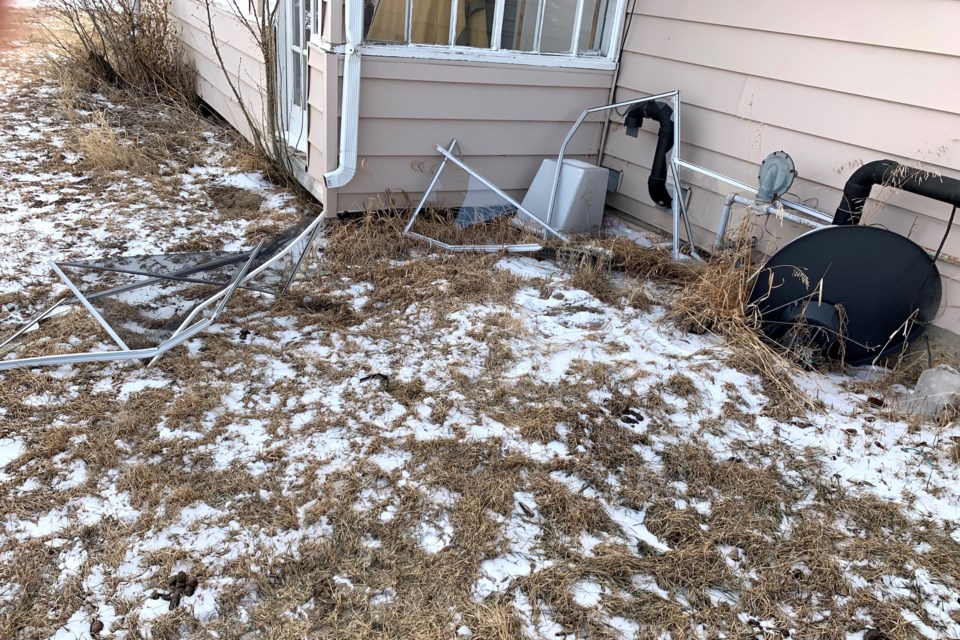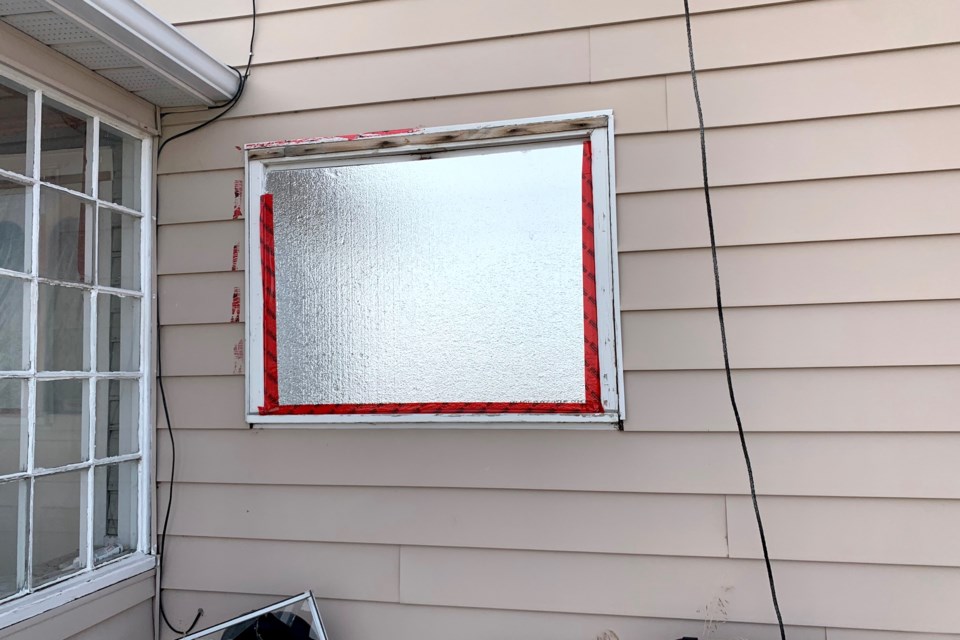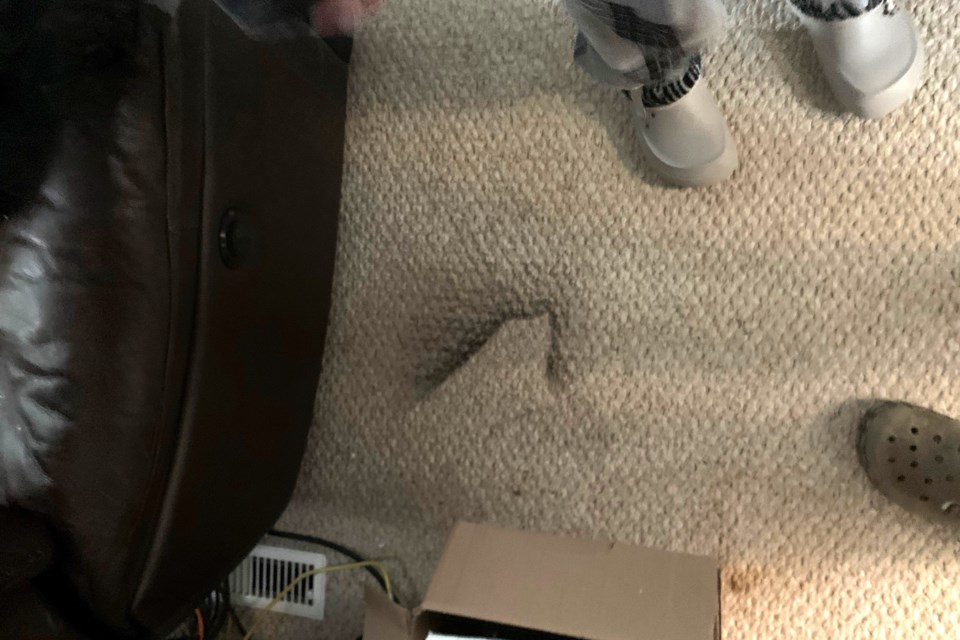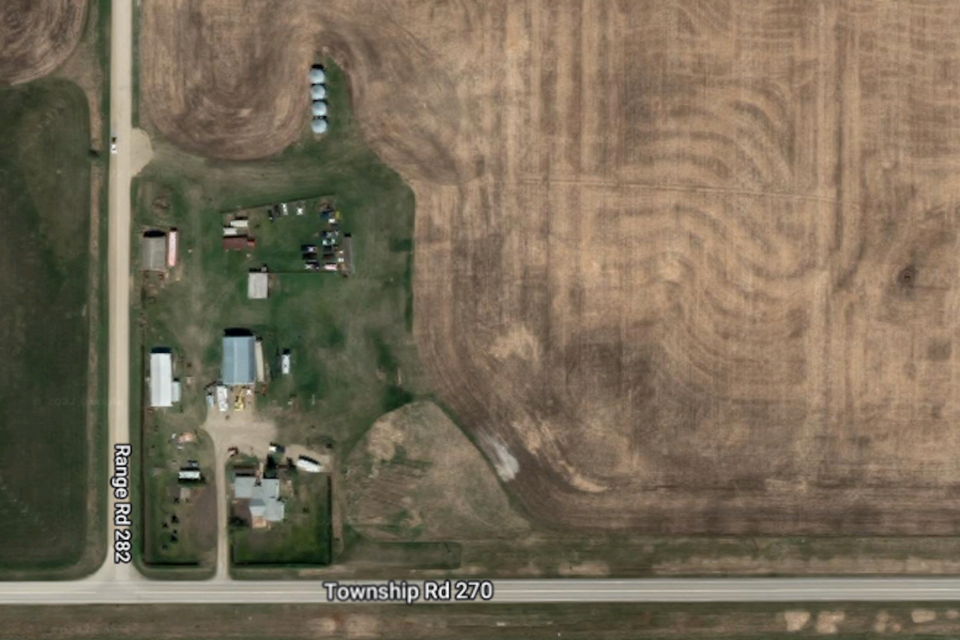A former Rocky View County couple has filed a $1.5 million lawsuit against the RCMP and Calgary Police Service (CPS) following a no-knock raid on their residence in 2020 – a raid they claim left them with nearly $40,000 in damages, mental health issues, and broken relationships.
“My clients want personal accountability of these officers. They want to see them charged criminally and fired,” said their lawyer, Tom Engel. “The way it goes in making complaints against the police, that's not likely to happen, even though it should.”
A statement of claim alleges numerous police vehicles stormed the couple’s property, which is located less than 10 kilometres east of Airdrie, on April 1, 2020. The officers sprayed tear gas into their home, and used an armoured vehicle to smash through their living room window.
Joshua Bennett and Jennifer Hacker were then arrested and detained for nearly four hours before they were released after police found no evidence of drugs or weapons on their property.

An earlier internal police review following the raid, initiated by their landlords’ complaints about damages to the property, found that the officers' actions were justified. Hacker and Bennett then made a complaint under the RCMP act and police act, which is currently under investigation. That complaint includes serious allegations like assault with a weapon, mischief to private property, and kidnapping, according to Engel.
On top of the complaints, their civil suit has been filed. CPS and RCMP representatives confirmed with their organizations' legal teams that they have not yet been officially served in relation to the alleged lawsuit. Given the potential pending legal matters, CPS and RCMP officials were unable to comment further.
“The only way they can get that personal accountability is through the complaints they've made and the only way they can get compensated is through the civil suit,” Engel explained.
The lawsuit names the Calgary Police officer in charge of the operation, more than 20 RCMP officers involved in the raid, the Calgary Police chief, the Alberta Law Enforcement Response Team (ALERT), and the attorney general of Canada.
Police initially obtained a search warrant for Bennett and Hacker’s rented home days before the raid in 2020 after mistakenly assuming their home was being used as a drug stash home, according to the claim.
The claim alleges police witnessed an alleged drug trafficker visiting the property in the month leading up to the raid, and in another instance, Bennett was observed leaving the home of that alleged drug trafficker with a black garbage bag that police believed contained drugs.

After reviewing aerial video of Bennett and Hacker’s property, RCMP concluded it was an ideal location to store drugs, that Bennet was involved in drug trafficking based on information from a confidential informant, and that Bennett had transported drugs to store at his property, the claim alleges. The claim also states those conclusions were unreasonable and incorrect, and that instead they had purchased cannabis from the person alleged to be a drug trafficker to help Hacker’s ongoing health condition. According to the claim, the black garbage back picked up by Bennett contained second-hand clothing, not drugs.
Engel explained that in order to obtain a search warrant, a police officer provides a sworn document of evidence to justify the search warrant for a judge or justice of the peace issuing the warrant.
“There is nothing in the criminal code that requires them to address whether they can enter a house without announcing their presence and normally that's by knocking on the door,” Engel explained.
While no-knock raids are currently legal without special authorization, Engel believes they are a real problem in Canada that can easily be amended by the federal government to require authorization by a judge.
On March 31, 2020, ALERT and CPS officers requested help from the RCMP Emergency Response Team (ERT) in executing the search warrant.
“ALERT and CPS knew, or should have known, that ERT involvement would involve unnecessary violence, damage to property, and physical and psychological damage to the occupants,” the claim stated.

On April 1, 2020, at least 20 RCMP members in 10 vehicles, including two armoured vehicles and a helicopter, arrived at the property at 7:25 a.m. to carry out the search warrant.
Once Hacker and Bennett opened the garage door to exit their home, which was filled with tear gas, they were met with guns pointed at them, the claim alleges.
“They yelled “Get the [expletive] down!” Bennett complied,” the claim read. “Hacker was having difficulty getting down because of a recent surgery. One or more of the RCMP members yelled to Hacker, “Come to me!” Hacker slowly approached the RCMP members with her hands up.”
The statement of claim alleges the RCMP member told Hacker they did not care about her recent surgery and aggressively turned her around by her shoulder before pushing her to the ground and hand-cuffing her. Hacker was then told she was under arrest, but was not informed why.
Engel explained that a search warrant is not an arrest warrant, which means the police had the power to search the property but could not lawfully arrest or detain Hacker and Bennett.
“To get an arrest warrant, you need to have reasonable probable grounds to believe that the person you're going to arrest has committed the criminal offense – and they didn't have that,” Engel said. “Unfortunately, in a lot of situations, the police seem to think that if they get a search warrant, they can go into your house and start detaining and arresting people.”
Engel said that when police entered the house, they should have known the information provided to them by their confidential source was wrong and that they could not rely on the information to arrest Hacker and Bennett.
“I see this happen a lot, when the cops know they've made a horrible mistake and they compound it by arresting people and taking them in for interrogation, just hoping for a confession,” Engel said. “Which would have given them grounds to arrest but they interrogated both of them and they had nothing.”
At some point, the claim alleges the RCMP members unlawfully forced open the front door, which broke the door frame. “This was unnecessary because the garage door was already open,” it stated.
After the raid, Hacker and Bennett were detained, arrested, and brought to a CPS building for unlawful questioning. They were released about four hours later and never charged for any crimes.
After losing about $30,000 worth of furniture and clothing, and about $6,000 worth of home security equipment, they claimed they never received forms from the RCMP to apply for compensation.
Their home became uninhabitable due to the contamination from tear gas and the broken windows and door, their statement of claim alleges. While staying in a trailer, they worked to clean and repair their rental property for the next six weeks.
“How often do you see people get compensated [in similar situations]? Well, not nearly as many times as it should happen and when it does happen, not nearly enough compensation,” Engel said. “But I do see it happen.”

The couple claimed their dogs were sick for months after the incident due to the tear gas and still appear to suffer from effects two years later. Hacker and Bennett allege they continue to suffer from post-traumatic stress disorder (PTSD) and incurred out-of-pocket expenses for treatment. Hacker never returned to work due to PTSD and Bennett lost his full-time job in January 2021 due to PTSD and missing work to repair their home.
In April 2021, they relocated to Lethbridge and stopped living together, according to the statement of claim, which added the incident caused increased irritability and mood swings, leading to the eventual breakdown of their relationship.
Their claim stated the RCMP did not have sufficient evidence that Bennett was trafficking and storing illegal drugs; that the excessive force used to carry out the search warrant was negligent and malicious; and that the forceful arrest constituted the intentional torts of assault and battery. Furthermore, it claimed their arrest and detainment without reason constituted false imprisonment, and that failing to compensate them was also negligent and malicious.
Engel explained one issue in Alberta is that a person can no longer take police officers to small claims court, but can only sue through the court of queen’s bench with a lawyer. This process becomes lengthy and expensive and limits access to justice for citizens who were wronged by police.
At the same time, police officers are able to take citizens to small claims courts.
“I think that really drives home to people about how unfair this double standard is,” Engel said.



